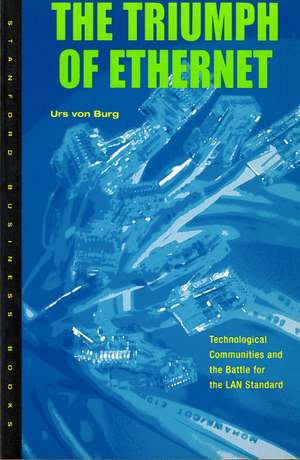The Triumph of Ethernet: Technological Communities and the Battle for the LAN Standard: Innovation and Technology in the World E
Autor Urs von Burgen Limba Engleză Paperback – 31 iul 2002
One of the most important elements in the computer revolution has been agreement on technological standards. The advances in communication allowed by millions of computers connecting over various networks are based on these networks sharing a common language. This book tells the complete story of the battle between several competing technologies in the late 1970s and early 1980s to become the compatibility standard in one high-tech arena, the LAN (local area network) industry.
In the end, a single technology succeeded in dominating the entire industry: Ethernet. The author argues that Ethernet triumphed not because it was better or cheaper, but because of a clever strategy by Ethernet’s corporate sponsors. This strategy mandated the building of a large supplier base around the technology in order to compensate for an inability to produce all required components and devices. Within a few years, Ethernet had greatly surpassed its competitors in gaining suppliers, which included specialized start-ups, semiconductor firms, and established computer manufacturers. This supplier advantage proved an invaluable strategic asset. As suppliers developed various price and product advantages that were easily adopted by Ethernet, its competitors were driven out of the market.
Key to understanding the importance of a supplier base in the race for standards is the crucial role of a technological community. The book demonstrates how technological communities account not only for critical differences in the standardization strategies of various LAN vendors, but also for the emergence of other important instances of technological competition. For example, the recent rise of Linux and Java can be seen as the result of successful community-driven strategies.
The story of the battle for the LAN standard is also a story of the Internet more broadly, and so the book offers unique insights into its dazzling growth, as LANs became important corporate on-ramps to the Internet and several LAN suppliers (such as 3Com) evolved into leading suppliers of Internet technology.
In the end, a single technology succeeded in dominating the entire industry: Ethernet. The author argues that Ethernet triumphed not because it was better or cheaper, but because of a clever strategy by Ethernet’s corporate sponsors. This strategy mandated the building of a large supplier base around the technology in order to compensate for an inability to produce all required components and devices. Within a few years, Ethernet had greatly surpassed its competitors in gaining suppliers, which included specialized start-ups, semiconductor firms, and established computer manufacturers. This supplier advantage proved an invaluable strategic asset. As suppliers developed various price and product advantages that were easily adopted by Ethernet, its competitors were driven out of the market.
Key to understanding the importance of a supplier base in the race for standards is the crucial role of a technological community. The book demonstrates how technological communities account not only for critical differences in the standardization strategies of various LAN vendors, but also for the emergence of other important instances of technological competition. For example, the recent rise of Linux and Java can be seen as the result of successful community-driven strategies.
The story of the battle for the LAN standard is also a story of the Internet more broadly, and so the book offers unique insights into its dazzling growth, as LANs became important corporate on-ramps to the Internet and several LAN suppliers (such as 3Com) evolved into leading suppliers of Internet technology.
| Toate formatele și edițiile | Preț | Express |
|---|---|---|
| Paperback (1) | 246.52 lei 3-5 săpt. | |
| Stanford University Press – 31 iul 2002 | 246.52 lei 3-5 săpt. | |
| Hardback (1) | 833.67 lei 6-8 săpt. | |
| Stanford University Press – 31 iul 2002 | 833.67 lei 6-8 săpt. |
Preț: 246.52 lei
Nou
Puncte Express: 370
Preț estimativ în valută:
47.17€ • 49.38$ • 39.03£
47.17€ • 49.38$ • 39.03£
Carte disponibilă
Livrare economică 15-29 martie
Preluare comenzi: 021 569.72.76
Specificații
ISBN-13: 9780804740951
ISBN-10: 080474095X
Pagini: 320
Dimensiuni: 152 x 229 x 20 mm
Greutate: 0.46 kg
Ediția:1
Editura: Stanford University Press
Colecția Stanford Business Books
Seria Innovation and Technology in the World E
ISBN-10: 080474095X
Pagini: 320
Dimensiuni: 152 x 229 x 20 mm
Greutate: 0.46 kg
Ediția:1
Editura: Stanford University Press
Colecția Stanford Business Books
Seria Innovation and Technology in the World E
Recenzii
"An important and defining look at the early days of local area networking. Von
Burg has captured the interplay of science, people, money, and luck that defines
the high-stakes technology business."
-—Jim Swartz, founder, Accel Partners
Burg has captured the interplay of science, people, money, and luck that defines
the high-stakes technology business."
-—Jim Swartz, founder, Accel Partners
"Few people are aware of the intense battles that resulted in today's networking standards. Urs von Burg's engaging history of this tumultuous period, with its analysis of the technological ecosystems and marketing economics involved, contains valuable lessons for anyone interested in capturing a dominant market share for an innovation."
-—Dr. Harry J. Saal, former chairman, Network General
-—Dr. Harry J. Saal, former chairman, Network General
"Superb. . . . A solid and thoroughly researched study of a major segment of the global high-technology economy. Von Burg's theory of 'technological communities' is an important contribution."
-—Richard Florida, Carnegie Mellon University
-—Richard Florida, Carnegie Mellon University
"A vivid picture of a turbulent time. Von Burg objectively describes the technical, financial, and personal battles involved, and he puts the issues into a larger context that will be useful for making sense of today's technological developments."
—Maris Graube, founder and ex-chair, IEEE 802.
—Maris Graube, founder and ex-chair, IEEE 802.
"This was a fascinating read."—Knowledge, Technology & Policy
"It was refreshing to see that—at last—one author in the standards domain acknowledges the importance of individual contributors and refrains from seeing the world purely through an economist's eyes."—Knowledge, Technology, & Policy
"I would highly recommend this book to anyone who is interested in standards research and/or history of computing and networking."—Knowledge, Technology, & Policy
"Urs von Burg's well-written book . . . .is timely and useful, and not just to business historians."—Business History Review
"It was refreshing to see that—at last—one author in the standards domain acknowledges the importance of individual contributors and refrains from seeing the world purely through an economist's eyes."—Knowledge, Technology, & Policy
"I would highly recommend this book to anyone who is interested in standards research and/or history of computing and networking."—Knowledge, Technology, & Policy
"Urs von Burg's well-written book . . . .is timely and useful, and not just to business historians."—Business History Review
Notă biografică
Urs von Burg, formerly venture capital business analyst with Aureus Private Equity AG (now Invision), is a senior consultant at The McKenna Group.
Textul de pe ultima copertă
“An important and defining look at the early days of local area networking. Von
Burg has captured the interplay of science, people, money, and luck that defines
the high-stakes technology business.”
-—Jim Swartz, founder, Accel Partners
“Few people are aware of the intense battles that resulted in today's networking standards. Urs von Burg's engaging history of this tumultuous period, with its analysis of the technological ecosystems and marketing economics involved, contains valuable lessons for anyone interested in capturing a dominant market share for an innovation.”
-—Dr. Harry J. Saal, former chairman, Network General
Burg has captured the interplay of science, people, money, and luck that defines
the high-stakes technology business.”
-—Jim Swartz, founder, Accel Partners
“Few people are aware of the intense battles that resulted in today's networking standards. Urs von Burg's engaging history of this tumultuous period, with its analysis of the technological ecosystems and marketing economics involved, contains valuable lessons for anyone interested in capturing a dominant market share for an innovation.”
-—Dr. Harry J. Saal, former chairman, Network General
Descriere
One of the most important elements in the computer revolution has been agreement on technological standards. This book tells the complete story of the battle between several competing technologies in the late 1970s and early 1980s to become the compatibility standard in one high-tech arena, the LAN (local area network) industry.
























